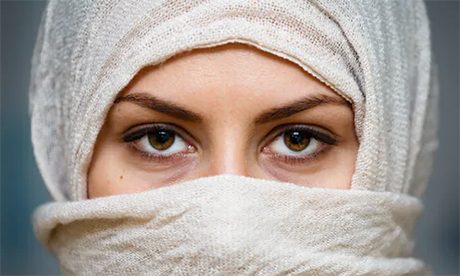The coronavirus pandemic has thrown up an interesting paradox in European countries that have banned the burqa, full-face veil.
In some French cities, for example, failure to cover your face and protect against COVID-19 can land you a €135 fine.
Yet, officially at least, you could also be fined as much as €150 for covering your face in public places if the covering is a full-face veil.
In 2011, France became the first European country to ban the full-face veil in public. Other European countries have followed by introducing total or partial bans of the burqa, including Denmark, Austria, Belgium, Bulgaria, Latvia and Norway.
Now, with many Europeans told they must wear face masks to combat the spread of COVID-19, some are highlighting the apparent contradiction.
“What’s the difference when you cover your face for religious reasons or when you cover your face for health reasons?” said Moana Genevey, gender policy officer at Equinet. “And when is it acceptable?”
The new ‘living together’
In 2014, the European Court of Human Rights (ECHR) dismissed France’s arguments to ban the wearing of the full-face veil in public on the grounds of public security and protection of gender equality.
However, it upheld the ban by accepting it constitutes an infringement of the French principle of “living together” (‘le vivre ensemble’).
Three years later, two Belgian women also took their case to the ECHR, arguing the so-called burqa ban was breaching human-rights law. Samia Belcacemi had stopped wearing the veil in public, fearing jail or a fine, while Yamina Oussar chose to stay at home.
Likewise, the ECHR ruled that Belgium did not violate any right to freedom of religion or discrimination law as it had the right to impose restrictions to ensure the principle of “living together”.
In the French case, the violation of the concept of “le vivre ensemble” was defined as “a denial of fraternity, constituting the negation of contact with others”.
However, the pre-COVID “living together” has little to do with the current coexistence in European countries based on safety distance.
“The discourse has completely changed and people are asked to cover their faces to be able to live together in a democratic society,” said Dr Jone Elizondo Urrestarazu, legal and policy officer at Equinet. “Living together doesn’t mean what it used to, so maybe it’s time to rethink the volatility of this argument.”
Genevey said COVID has raised the issue: “Some women were asking whether or not the ban would apply to them in the context of the pandemic. Now the question is: will we go back to normal afterwards?”
COVID-19 and public safety
Belgium is one of the European countries where covering one’s face with a piece of cloth is banned, but wearing a face mask is now mandatory.
The so-called “burqa ban” was first implemented in Belgium in 2011, forbidding any face-covering clothing in public that could conceal someone’s identity.
One of the main justifications was that “people in public spaces should be ‘recognisable’ and ‘identifiable’ on the grounds of public security”. Exceptions are allowed for labour regulations or festivities, but not for health reasons.
But because of the health emergency, this public safety principle seems to have been put to one side.
“In the short term, we might experience an increase in common criminality, as they go unrecognised wearing face masks,” said Professor Kenneth Lasoen, an intelligence and security expert.
“To offset the situation, municipalities are investing in CCTV cameras to monitor those wearing a face mask in the streets.”
But, in the longer term, there are concerns the coronavirus pandemic has weakened the argument against banning full-face veils.
“We are very likely to face a constitutional challenge, as the current situation sets a precedent for people who want to wear any kind of face-covering in public,” added Prof Lasoen. Continue reading
